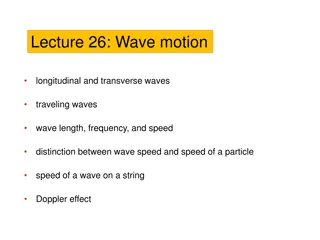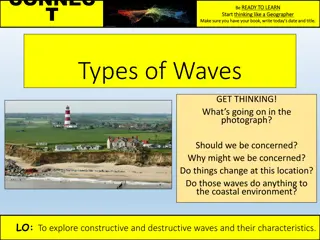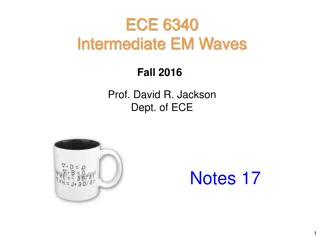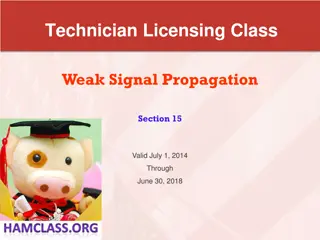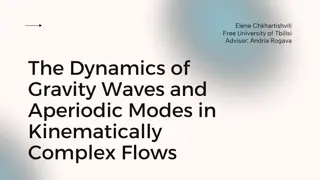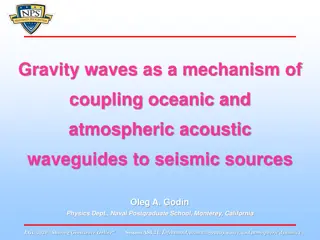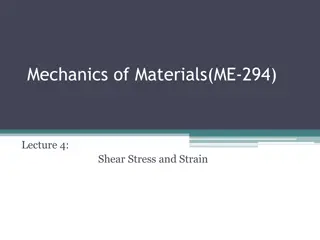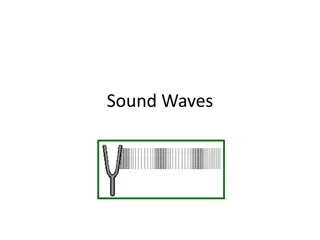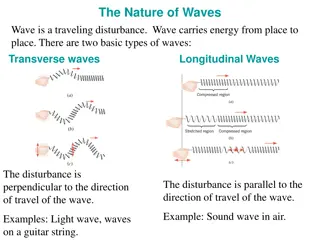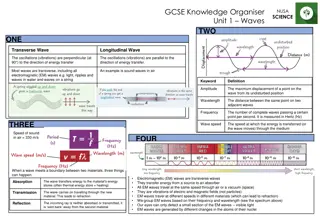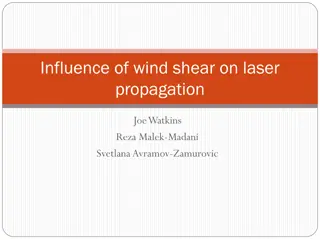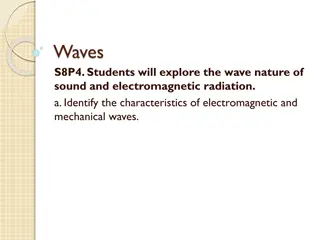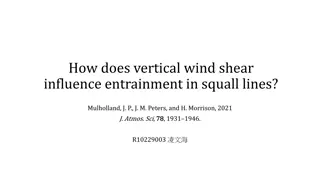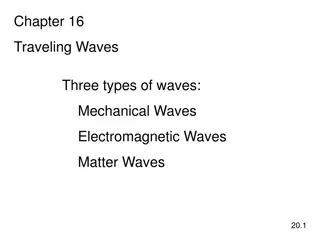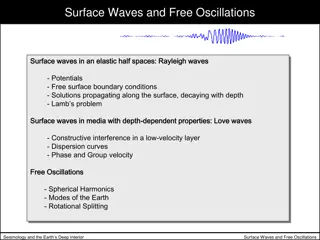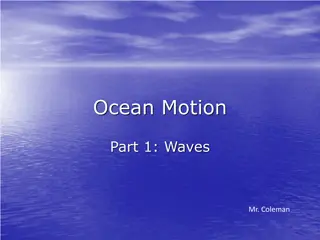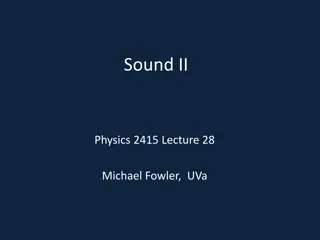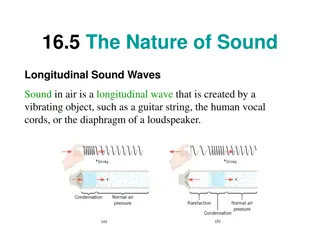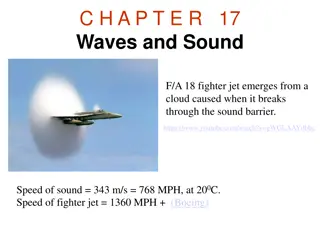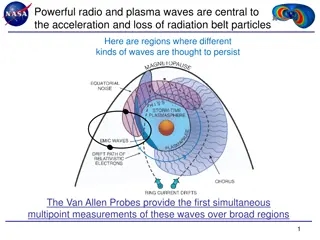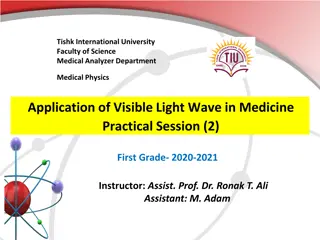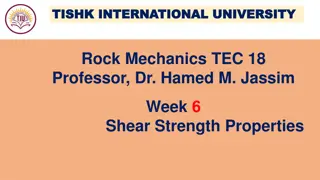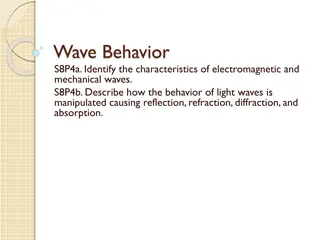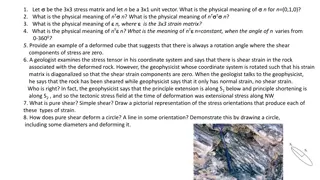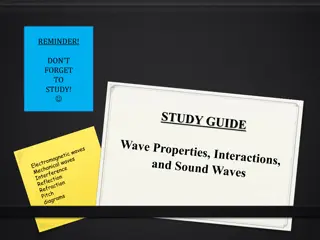Understanding Brain Waves: Frequencies and Behaviors
Brain waves are electromagnetic signals produced by the brain, categorized by frequencies into Delta, Theta, Alpha, and Beta waves, each associated with different states of consciousness and behaviors. These waves play a crucial role in our brain's energy utilization and overall functioning.
1 views • 11 slides
Understanding Earth's Interior through Seismic Waves: Part 1
Seismic waves provide crucial evidence about Earth's composition and structure. By analyzing the behavior of primary, secondary, and surface waves, scientists can determine the different layers and materials within the Earth. Primary waves travel through both solid and liquid parts, while secondary
10 views • 10 slides
Understanding Types of Waves and Energy Transport
Explore the different types of waves such as transverse, longitudinal, and surface waves, along with electromagnetic waves. Learn about their properties, how they move through mediums, and their significance in various applications like sound transmission, earthquake detection, and energy transport.
3 views • 10 slides
Exploring Types of Waves and Energy Transport
Discover the various types of waves such as transverse, longitudinal, surface, and electromagnetic waves, along with their characteristics and applications in energy transportation. Learn about the differences between mechanical and electromagnetic waves, how waves transmit energy, and their signifi
3 views • 10 slides
Understanding Wave Motion: Longitudinal and Transverse Waves
Explore the fundamentals of wave motion including longitudinal and transverse waves, wave length, frequency, speed, and the Doppler effect. Learn about different types of waves, their characteristics, and the distinction between wave speed and the speed of a particle. Discover the properties of wave
2 views • 18 slides
Understanding Constructive and Destructive Waves in Geographical Context
Exploring the characteristics of constructive and destructive waves in geography. Learn how waves are formed, what happens when they reach the coast, and their impact on the coastal environment. Dive into the dynamics of wave movement and the distinctions between constructive and destructive waves.
0 views • 10 slides
Understanding Waves: A Visual Exploration
Explore the fascinating world of waves through visually engaging images and interactive clickers. Learn about different types of waves, including longitudinal and transverse waves, and discover what waves carry - energy, not matter. Delve into the concepts of mechanical and electromagnetic waves, an
1 views • 37 slides
Understanding Sound Waves and Vibration in Music
Dive into the world of sound waves and vibrations with this educational content. Explore how vibrations spread from vibrating objects, how different instruments produce sound, and the concepts of compression, rarefaction, solids, liquids, and gases in relation to sound. Discover the factors that aff
0 views • 9 slides
Understanding General Plane Waves in Electromagnetic Theory
This study focuses on the analysis of general plane waves in electromagnetic theory, covering topics such as the general form of plane waves, Helmholtz equation, separation equation, wavenumber vector, Maxwell's equations for plane waves, and the symbolic representation of plane waves. The content d
0 views • 41 slides
Understanding Interference and Beats in Waves
Explore the fascinating phenomena of interference and beats in waves, where overlapping waves interact to create patterns of constructive and destructive interference. Witness how sound waves can also produce beats when interfering in time, resulting in a slow envelope effect. Delve into the princip
0 views • 40 slides
Understanding Weak Signal Propagation in Radio Waves
This informative content delves into weak signal propagation and its various aspects related to electromagnetic waves, particularly in the context of radio communication. It covers topics such as radio waves, radio horizon, knife-edge diffraction, tropospheric scatter mode, auroral reflection, and m
1 views • 37 slides
Exploring Gravity Waves and Aperiodic Modes in Kinematically Complex Flows
Delve into the dynamics of gravity waves and aperiodic modes in kinematically complex flows in this detailed study by Elene Chkhartishvili from Free University of Tbilisi. The research covers topics like internal gravity waves, main formalism, linearization of the velocity field, main equations, and
0 views • 16 slides
Gravity Waves as a Mechanism of Coupling Oceanic and Atmospheric Acoustic Waveguides to Seismic Sources
Direct excitation of acoustic normal modes in horizontally stratified oceanic waveguides is negligible for shallow earthquakes due to velocity disparities. This study evaluates the contribution of scattering by hydrodynamic waves in generating abyssal T-waves. The research explores the role of scatt
1 views • 6 slides
Understanding Shear Stress in Mechanics of Materials
Shear stress is a critical concept in Mechanics of Materials, describing the stress parallel to a surface due to applied forces. This stress is crucial in various applications like metal joints, punching operations, and more. Shear stress calculations can help engineers determine the strength and du
0 views • 19 slides
Exploring Essential Questions About Sound Waves
Delve into the fundamental aspects of sound waves through essential questions, observations of sound wave behavior, key facts, and measurements. Understand the nature of sound waves, including frequency, amplitude, speed of sound, and perception attributes like pitch and intensity level. Discover ho
0 views • 20 slides
Exploring the Nature of Waves and Sound
Understanding the nature of waves, both transverse and longitudinal, and their properties such as amplitude, wavelength, and frequency. Delve into the world of water waves, periodic waves, and the speed of waves on a string. Learn about the longitudinal nature of sound waves, the audible frequency r
0 views • 16 slides
Understanding Waves: Properties, Behaviors, and Applications
Waves come in different forms - transverse and longitudinal - each with distinct characteristics and behaviors. Understanding concepts like amplitude, wavelength, frequency, and wave speed is crucial in grasping how waves transfer energy through different materials. The interaction of waves with bou
0 views • 9 slides
Experimental Study on Wind Shear Effects on Laser Propagation
Research conducted by Joe Watkins, Reza Malek-Madani, and Svetlana Avramov-Zamurovic to analyze the impact of wind shear on laser propagation. The experiments involved a HeNe red laser passing through a tunnel with varying wind speeds. Data on light intensities and wind influence were collected and
0 views • 7 slides
Understanding Beam Elements and Shear Effects in Structural Analysis
Beam elements play a crucial role in structural analysis, offering insights into line elements with various degrees of freedom for bending modes and stress analysis. Shear deflection and stresses in beams are essential considerations when accounting for shear effects. Learn about real constants, sha
0 views • 16 slides
Understanding Shear and Moment in Beams
Beams play a crucial role in mechanical engineering, with two main types - statically determinate and indeterminate beams. Explore the definition of beams, loading types, and the concept of shear and moment diagrams to understand the behavior of beams under different loads and reactions. Learn how t
0 views • 8 slides
Cosmic Shear Measurement in Fourier Space and Its Scientific Goals
Exploring the cosmic shear in Fourier space with a collaborative effort led by Jun Zhang from Shanghai Jiao Tong University sheds light on fundamental scientific questions related to dark energy, the geometry of the universe, General Relativity, cold dark matter, and cosmic structure density distrib
0 views • 48 slides
Understanding Waves: Characteristics and Types Explained
Explore the wave nature of sound and electromagnetic radiation, distinguishing between electromagnetic and mechanical waves. Waves are energy-carrying disturbances that do not transport matter. Mechanical waves require a medium for energy transfer, while electromagnetic waves can travel through spac
0 views • 26 slides
Influence of Vertical Wind Shear on Entrainment in Squall Lines
The strength and direction of low-level (LL) and upper-level (UL) wind shear influence the properties of squall line updrafts, with stronger shear environments fostering wider updrafts that are less susceptible to entrainment-driven dilution. The relative influences of LL and UL shear on this relati
0 views • 40 slides
Persistence of Langmuir Modes in Complex Shear Flows
Exploring the persistence of Langmuir modes in kinematically complex plasma flows with a focus on shear flows in nature and historical backgrounds. The research delves into the methodology of classical theory and introduces the nonmodal approach to address limitations. Details on shear flow definiti
0 views • 16 slides
Understanding Traveling Waves: Types, Properties, and Equations
Explore the world of traveling waves, including mechanical, electromagnetic, and matter waves. Learn about transverse and longitudinal wave motion, the speed of waves in strings, wave frequency, wavelength, and speed relationships, as well as wave equations for non-repeating waves over space and tim
1 views • 30 slides
Understanding Standing Waves in Physics
Standing waves in physics are periodic waves that result from the interference of reflected and inverted waves, creating nodes and antinodes along a medium. These standing wave patterns can be observed in vibrating strings, such as guitar strings, where specific frequencies produce distinct harmonic
0 views • 29 slides
Surface Waves and Free Oscillations in Seismology
Exploring surface waves, potentials, and free oscillations in seismology with a focus on Rayleigh waves, Love waves, and wave equations. Understand the dispersion relation, geometry, and solutions for waves propagating in elastic half spaces and media with depth-dependent properties.
0 views • 55 slides
Understanding Ocean Waves and Their Dynamics
Exploring the science behind ocean waves, this resource delves into why waves occur, the components of a wave, how water moves within a wave, and the effects of waves hitting a beach. From defining waves to discussing wave characteristics, this content provides valuable insights into the fascinating
0 views • 13 slides
Understanding Spectrometry and Electromagnetic Waves
Spectrometry plays a vital role in analytical chemistry by studying the interactions of radiation and matter through electromagnetic waves. These waves, characterized by varying electric and magnetic fields, travel at the speed of light in vacuum with a constant velocity. The properties and characte
0 views • 24 slides
Describing Rheological Properties of Unknown Materials - In-Class Activity (Spring 2015)
Explore the rheological properties of unknown materials in a hands-on in-class activity. Students work in teams to identify whether samples are pseudoplastic, Newtonian, or dilatant fluids based on viscosity changes with shear rate. Corn syrup, corn starch, icing, and toothpaste are analyzed, with f
0 views • 5 slides
Understanding Sound Waves: Harmonic Vibrations and Longitudinal Waves
Exploring the concepts of harmonic string vibrations in musical instruments, longitudinal waves in pipes, boundary conditions at pipe open ends, and the wave equation for waves in two and three dimensions. Topics include interference, Doppler effect, and wavelength calculations for standing harmonic
0 views • 19 slides
Understanding Electromagnetic Waves: Essential Concepts and Applications
Electromagnetic waves are a fundamental aspect of physics, characterized by the transmission of energy through vibrating electric and magnetic fields. This comprehensive guide explores the production, properties, and applications of electromagnetic waves, shedding light on topics such as photon beha
0 views • 21 slides
Understanding Sound Waves: Nature, Properties, and Characteristics
Sound waves are longitudinal waves created by vibrating objects in air. They cannot propagate in a vacuum. Understanding how we hear involves exploring wave representations and the frequency ranges of sound waves, from infrasonic to ultrasonic. Sound also exhibits objective and subjective properties
0 views • 12 slides
Understanding Waves and Sound: A Visual Exploration
Explore the nature of waves and sound through a visual journey covering topics like transverse waves, longitudinal waves, water waves, periodic waves, wave speed, the speed of a wave on a string, the nature of sound, and the frequency of sound waves. Discover how waves carry energy, the different ty
1 views • 32 slides
Unveiling the Role of Radio and Plasma Waves in Particle Acceleration
Radio and plasma waves play a crucial role in the acceleration and loss of radiation belt particles. The Van Allen Probes provide groundbreaking multipoint measurements of these waves in various regions, shedding light on phenomena such as chorus waves and resonant wave acceleration. Strong correlat
0 views • 8 slides
Understanding Visible Light Waves in Medicine and Physics
Visible light waves play a crucial role in medicine and physics, where they are the only electromagnetic waves that humans can see. These waves create the colors of the rainbow with varying wavelengths, allowing us to perceive different colors and forms of light. Understanding the properties of visi
0 views • 22 slides
Understanding Shear Strength in Engineering Materials
Shear strength is a crucial mechanical property that defines a material's ability to resist forces causing internal structure to slide. This property plays a significant role in various engineering fields, impacting design, construction, and material selection. Shear strength is essential in prevent
0 views • 31 slides
Understanding Light Wave Behavior: Reflection and Refraction
Explore the characteristics of electromagnetic and mechanical waves along with how light waves can be manipulated through reflection and refraction. Discover how reflection occurs when waves bounce off surfaces and how refraction bends waves as they move between different mediums, affecting their sp
0 views • 18 slides
Understanding Strain and Stress: Concepts and Applications for Geologists and Geophysicists
This content delves into various aspects of stress and strain in the context of geology and geophysics, exploring the physical meanings of unit vectors, stress matrices, strain matrices, pure shear, simple shear, and their implications on deformation characteristics. It also discusses scenarios wher
0 views • 4 slides
Understanding Waves: Definitions and Characteristics
This educational content covers definitions and characteristics of waves, including transverse and longitudinal waves, how waves travel through a medium, interference, earthquake waves, sound properties like amplitude and pitch, the Doppler Effect, and differences between reflection and refraction.
0 views • 10 slides




